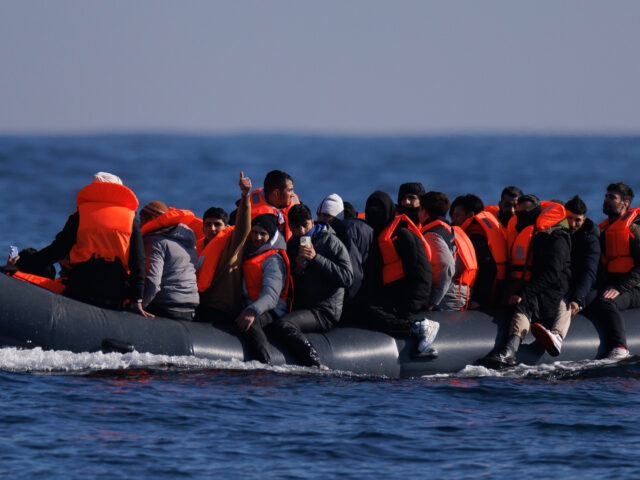Illegal migration in the English Channel has surged by 43 per cent over last year as nearly 800 boat migrants were ferried ashore at Dover over the Easter holiday weekend.
Crossing the Channel in 16 boats, some 791 illegals were recorded reaching British shores over the weekend, with 349 arriving on Saturday and a further 442 on Easter Sunday, according to official Home Office figures.
This means that in the first three months of the year, a record high of 5,435 migrants successfully reached the UK after being smuggled across the busy waterway from the beaches of France by people-smuggling networks operating on both sides of the Channel.
The previous record for January to March was set in 2022 when 4,548 illegals were recorded landing at the port of Dover. It is also 43 per cent higher than during the same time period last year when 3,793 were logged, GB News reported.
The true number for all three years will likely never be known, however, given that the government figures only represent those migrants who were intercepted by the British Border Force in the Channel and brought ashore and not those who managed to evade detection and break into the country unobserved.
Nevertheless, the recorded surge in illegal arrivals will serve as another indictment against struggling Prime Minister Rishi Sunak, who made “stopping the boats” one of his key pledges to the public after taking office against the will of his own voters in a globalist-backed coup against short-termed PM Liz Truss in 2022.
While the numbers decreased by around a third last year, even the BBC admitted that this was likely a result of poor weather, with fewer days with navigable waters than in the year prior, rather than any specific policy from the government.
Indeed, aside from agreeing to pay France nearly a half billion more in British taxpayer money to police its own borders, there has been little in the way of actual policy from the government to crack down on illegal boat migration.
The main plan of deterrence, the scheme of sending boat migrants to Rwanda rather than putting them up in hotels in Britain, has yet to come into effect despite being introduced to the public nearly two years ago by Boris Johnson’s government.
After the initial bill was struck down by the Supreme Court last year, over concerns about the safety of the East African nation and the likelihood of Rwanda deporting migrants back to their home countries, a legal fix has been working its way through parliament.
Although the bill was expected to already have been made law, it suffered a series of setbacks in the House of Lords, and therefore will not be considered by the House of Commons again until April 15th, putting the notion of beginning migrant removal flights by the Spring deeply in doubt.
Critics of the legislation have also warned that it would be powerless to stop the European Court of Human Rights (ECHR) from stepping in again — as it did in 2022 — to block removal flights from taking off, given that the post-Brexit governments have refused to leave the European institution, which is technically outside of the EU and therefore Britain’s membership was not impacted by Brexit.
In response to the surge in illegal boat migration this year, a Home Office spokesman said: “The unacceptable number of people who continue to cross the English Channel demonstrates exactly why we must get flights to Rwanda off the ground as soon as possible.
“We remain committed to building on the successes that saw arrivals drop by more than a third last year, including tougher legislation agreements with international partners, in order to save lives and stop the boats.”

COMMENTS
Please let us know if you're having issues with commenting.